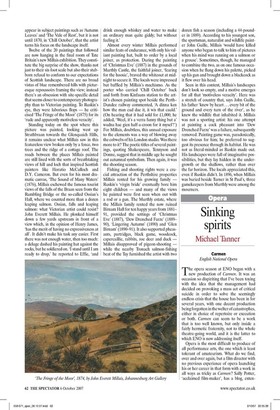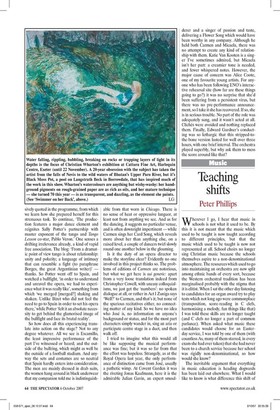Sinking spirits
Michael Tanner Carmen English National Opera The opera season at ENO began with a new production of Carmen. It was an occasion so dispiriting that I've been toying with the idea that the management had decided on provoking a mass act of critical suicide in order to solve the seemingly endless crisis that the house has been in for several years, with one decent production being forgotten in the welter of catastrophes, either in choice of repertoire or execution or both. Carmen can seem to be a work that is too well known, but only inside a fairly hermetic fraternity, not to the whole theatre-going world, and it is the latter to which ENO is now addressing itself.
Opera is the most difficult to produce of all performance arts, the one which is least tolerant of amateurism. What do we find, over and over again, but a film director with no previous experience of opera launching his or her career in that form with a work in all ways as tricky as Carmen? Sally Potter, 'acclaimed film-maker', has a blog, extensively quoted in the programme, from which we learn how she prepared herself for this strenuous task. To continue, 'The production features a major dance element and reignites Sally Potter's partnership with master exponent of the tango and Tango Lesson co-star, Pablo Veron.' One senses a drifting irrelevance already, a kind of vapid free association. The blog: 'From a dramatic point of view tango is about relationship: unity and polarity; a language of intimacy that can resemble a fight (to paraphrase Borges, the great Argentinian writer)' — thanks. So Potter went off to Spain, and watched a bullfight, 'in order to understand and unravel the opera, we had to experience what it was really like', something from which 'we merged [merged?] shaking and shaken. Unlike Bizet who did not feel the need to go to Spain in order to set his opera there,' while Potter 'felt it an absolute necessity to get behind the glamorised image of the bullfight and face its brutal reality'.
So how does all this experiencing translate into action on the stage? Not to any degree whatever. All we see is Escamillo, the least impressive performance of the part I've witnessed or heard; and the outside of the bullring, which might as well be the outside of a football stadium. And anyway the sets and costumes are so neutral that Spain hardly enters into consideration. The men are mainly dressed in drab suits, the women hang around in black underwear that my companion told me is indistinguishable from that worn in Chicago. There is no sense of heat or oppressive languor, at least not from anything we see. And as for the dancing, it suggests no particular venue, and is often downright impertinent — while Carmen sings her Card Song, which reveals more about her than anything else, on a raised level, a couple of dancers twirl slowly round one another below in the gloaming.
Is it the duty of an opera director to make the storyline clear? Evidently no one involved in this project thinks so. The problems of editions of Carmen are notorious, but what we get here is sui generic: apart from a very loose translation indeed from Christopher Cowell, with uneasy colloquialisms, we just get the 'numbers': no spoken dialogue at all, or rather in Act I Zuniga says 'Well?' to Carmen, and that's it; but none of the spurious recitatives either, no connecting matter of any kind. So we have no idea who Jose is, no information on anyone's background or status, and for the most part characters simply wander in, sing an aria or participate centre stage in a duet, and then walk off.
I tried to imagine what this would all be like supposing the musical performance was fine; but it was so far from that the effort was hopeless. Strangely, as at the Royal Opera last year, the only performance of distinction came from Jose, usually a pathetic wimp. At Covent Garden it was the riveting Jonas Kaufmann, here it is the admirable Julian Gavin, an expert smoulderer and a singer of passion and taste, delivering a Flower Song which would have been worthy in any company. Although he held both Carmen and Micaela, there was no attempt to create any kind of relationship with them. Katie Van Kooten is a singer I've sometimes admired, but Micaela isn't her part: a creamier tone is needed, and fewer whispered notes. However, the major cause of concern was Alice Coote, one of my favourite young artists. For anyone who has been following ENO's interactive rehearsal site (how far are these things going to go?) it was no surprise that she'd been suffering from a persistent virus, but there was no pre-performance announcement, so I take it she has recovered. If so, she is in serious trouble. No part of the role was adequately sung, and it wasn't acted at all. Clichés were avoided and nothing replaced them. Finally, Edward Gardner's conducting was so lethargic that this stripped-tothe-bone version lasted for well over three hours, with one brief interval. The orchestra played superbly, but why ask them to mess the score around like that?






























































 Previous page
Previous page